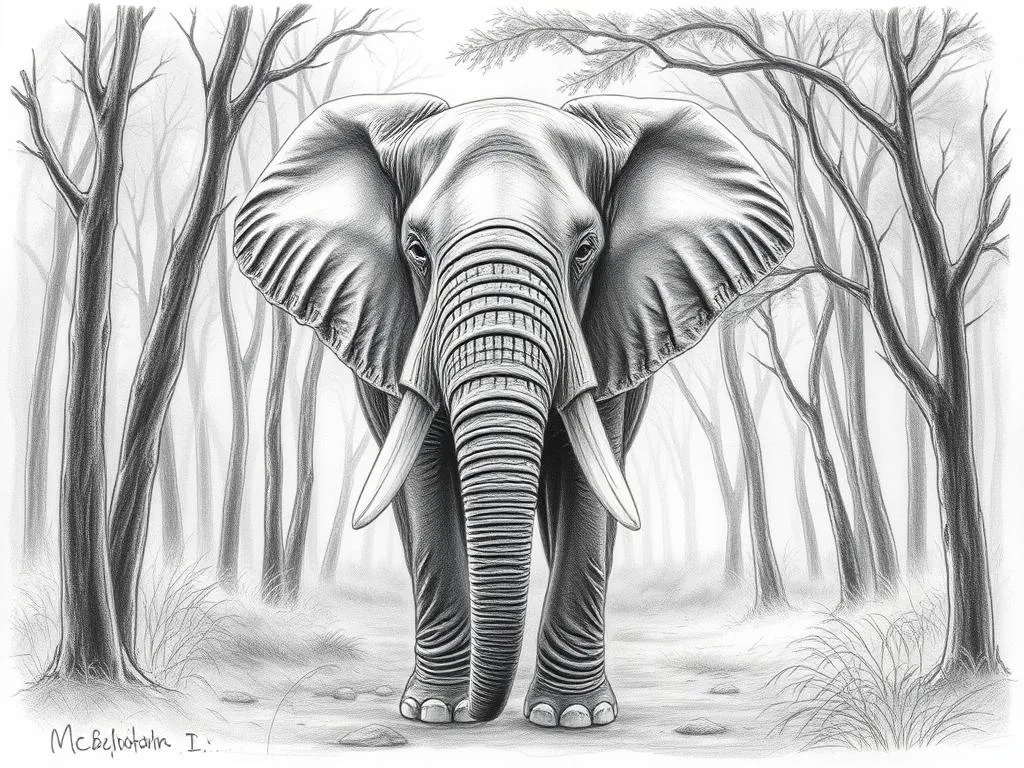The Enigmatic African Forest Elephant: Symbolism and Spiritual Significance

Disclaimer: Some images on this website are AI-generated artworks and may not accurately represent real animals.
The African forest elephant holds a unique place in the tapestry of wildlife, embodying profound symbolism and meaning that transcends its physical presence. As a subspecies of the African elephant, it is notably smaller than its savanna counterpart and possesses distinct features that adapt it to the dense, tropical forests of Central and West Africa. This blog post delves into the captivating world of the African forest elephant, exploring its characteristics, behaviors, and the rich symbolism it carries across cultures.
Understanding the African Forest Elephant
Physical Characteristics
The African forest elephant is characterized by several unique physical features that differentiate it from other elephants. Below is a table summarizing its key traits:
| Feature | Description |
|---|---|
| Size | Smaller than savanna elephants, reaching 8-10 feet at the shoulder. |
| Weight | Typically weighs between 5,000 to 10,000 pounds. |
| Tusks | Straight and smaller tusks, often used for digging and foraging. |
| Ears | Smaller ears compared to savanna elephants, aiding in heat regulation. |
| Skin | Darker skin with a more textured appearance, adapted to forest environments. |
| Feet | Rounder feet that help distribute weight on soft, forest floors. |
These adaptations are crucial for their survival in dense forest habitats, where navigation requires agility and strength.
Behavioral Traits
The African forest elephant exhibits fascinating behavioral traits that enhance its survival and social structure. These elephants are known for their complex social interactions, often living in matriarchal herds that consist of related females and their offspring.
They communicate through a variety of vocalizations, including low-frequency rumbles that can travel long distances, allowing them to maintain contact within the dense foliage. Their foraging habits are equally impressive; they primarily feed on leaves, fruits, and bark, using their tusks to access food sources that are otherwise difficult to reach.
Habitat and Distribution
The habitat of the African forest elephant spans across the lush rainforests of West and Central Africa. These elephants are primarily found in countries such as Gabon, Cameroon, and the Democratic Republic of Congo.
Their presence plays a critical role in maintaining the health of the forest ecosystems. As they forage, they help to disperse seeds and create pathways through dense vegetation, which supports a diverse array of wildlife. Unfortunately, habitat loss and poaching pose significant threats to their populations, highlighting the urgent need for conservation efforts.

Symbolism & Spiritual Meaning
Wisdom and Intelligence
The African forest elephant is often seen as a symbol of wisdom and intelligence. Their social structures reflect a deep understanding of relationships and community, showcasing how they nurture and protect one another. This wisdom is not just a reflection of their social dynamics but also of their long memory, which enables them to navigate complex forest terrains and remember locations of waterholes and food sources.
In many cultures, elephants symbolize knowledge, representing the importance of learning from past experiences and the value of collective wisdom.
Gentleness and Strength
Another significant aspect of the African forest elephant’s symbolism is its dual nature of gentleness and strength. Despite their massive size and power, these elephants are known for their gentle demeanor, particularly when interacting with their young. This juxtaposition serves as a reminder that true strength lies not only in physical might but also in kindness and compassion.
They are seen as protectors of their environment, reflecting a balance between ferocity and gentleness. This duality resonates deeply with humans, symbolizing the importance of embracing both strength and empathy in our lives.
Connection to Nature
The African forest elephant’s role in maintaining the balance of its ecosystem further solidifies its symbolism as a connector to nature. By foraging and dispersing seeds, they contribute to the growth of diverse plant species, which in turn support various forms of life. This ecological balance is a powerful reminder of the interconnectivity of all living beings and the importance of respecting and nurturing our environment.
In various spiritual traditions, elephants symbolize the embodiment of nature’s wisdom, urging us to live harmoniously with the natural world.
African Forest Elephant in Dreams
Common Interpretations
Dreams involving the African forest elephant can carry profound meanings. Below is a table highlighting common interpretations associated with dreaming of elephants, particularly the forest variety:
| Dream Scenario | Interpretation |
|---|---|
| Seeing an elephant in a forest | Represents a deep connection to nature and intuition. |
| An elephant charging towards you | Indicates a need to face challenges with strength. |
| A playful elephant with young ones | Symbolizes family bonds and nurturing relationships. |
| An elephant walking calmly | Suggests inner peace and stability in life. |
These interpretations serve as a guide, offering insights into the messages our subconscious mind may be conveying through these majestic creatures.
Messages of the Subconscious
When the African forest elephant appears in dreams, it often signifies personal growth, resilience, and emotional strength. The presence of this elephant can indicate a journey towards self-discovery, prompting dreamers to reflect on their life choices and relationships.
The elephant’s nurturing nature may also highlight the importance of family ties and the support systems we rely on. It encourages individuals to embrace their emotions and seek harmony within themselves and with others.
Cultural Perspectives
The symbolism of the African forest elephant varies across cultures, with each tradition offering unique interpretations. In some African communities, elephants are revered as ancestral spirits, representing strength and guidance. In contrast, other cultures may perceive them as guardians of wisdom, urging individuals to seek knowledge and understanding.
The diversity of meanings illustrates the elephant’s universal significance, transcending geographical boundaries and cultural differences.
Modern Interpretations
Cultural Significance
In contemporary African folklore, the African forest elephant holds a significant place, often depicted in art, stories, and traditions. These representations emphasize the elephant’s connection to nature and its role as a guardian of the forest.
Artists frequently draw inspiration from the elephant’s majestic presence, using it as a symbol of strength, resilience, and the importance of protecting the environment. Through various mediums, the cultural significance of the elephant is celebrated, fostering awareness and appreciation for this incredible species.
Conservation Symbol
The plight of the African forest elephant serves as a powerful symbol for broader environmental issues. As populations decline due to poaching and habitat destruction, this magnificent creature represents the urgent need for conservation efforts.
Awareness campaigns often use the image of the forest elephant to highlight the interconnectedness of wildlife and their ecosystems. By protecting these elephants, we also safeguard the health of the forests they inhabit, promoting biodiversity and ecological stability.
Personal Totem and Spirit Animal
For many individuals, the African forest elephant may serve as a powerful totem or spirit animal. Those who resonate with the elephant are often drawn to its qualities of wisdom, resilience, and deep connection to nature.
Embracing the symbolism of the forest elephant can inspire personal growth, encouraging individuals to seek wisdom from their experiences and relationships. It serves as a reminder to honor the natural world and strive for balance in our lives.
Key Takeaways
- The African forest elephant symbolizes wisdom and intelligence, reflecting the importance of community and learning from experiences.
- It embodies the duality of gentleness and strength, reminding us that true power lies in kindness and compassion.
- The elephant plays a vital role in maintaining ecological balance, representing our connection to nature and the need to protect it.
- Dreams of the forest elephant can indicate personal growth, family ties, and emotional strength, offering insights into our subconscious.
- The cultural significance of the elephant highlights its role in folklore and art, emphasizing the importance of conservation efforts.
Conclusion
The African forest elephant stands as a powerful symbol of wisdom, strength, and harmony with nature. Its rich symbolism resonates with individuals across cultures, urging us to reflect on our connection to the environment and the importance of nurturing our relationships.
In a world facing numerous environmental challenges, the plight of the African forest elephant calls for action and awareness. By recognizing the profound significance of this majestic creature, we can inspire a deeper appreciation for wildlife and a commitment to protecting our planet.
As we contemplate the enduring symbolism of the African forest elephant, let us strive to embody its qualities of wisdom, resilience, and compassion in our own lives.







